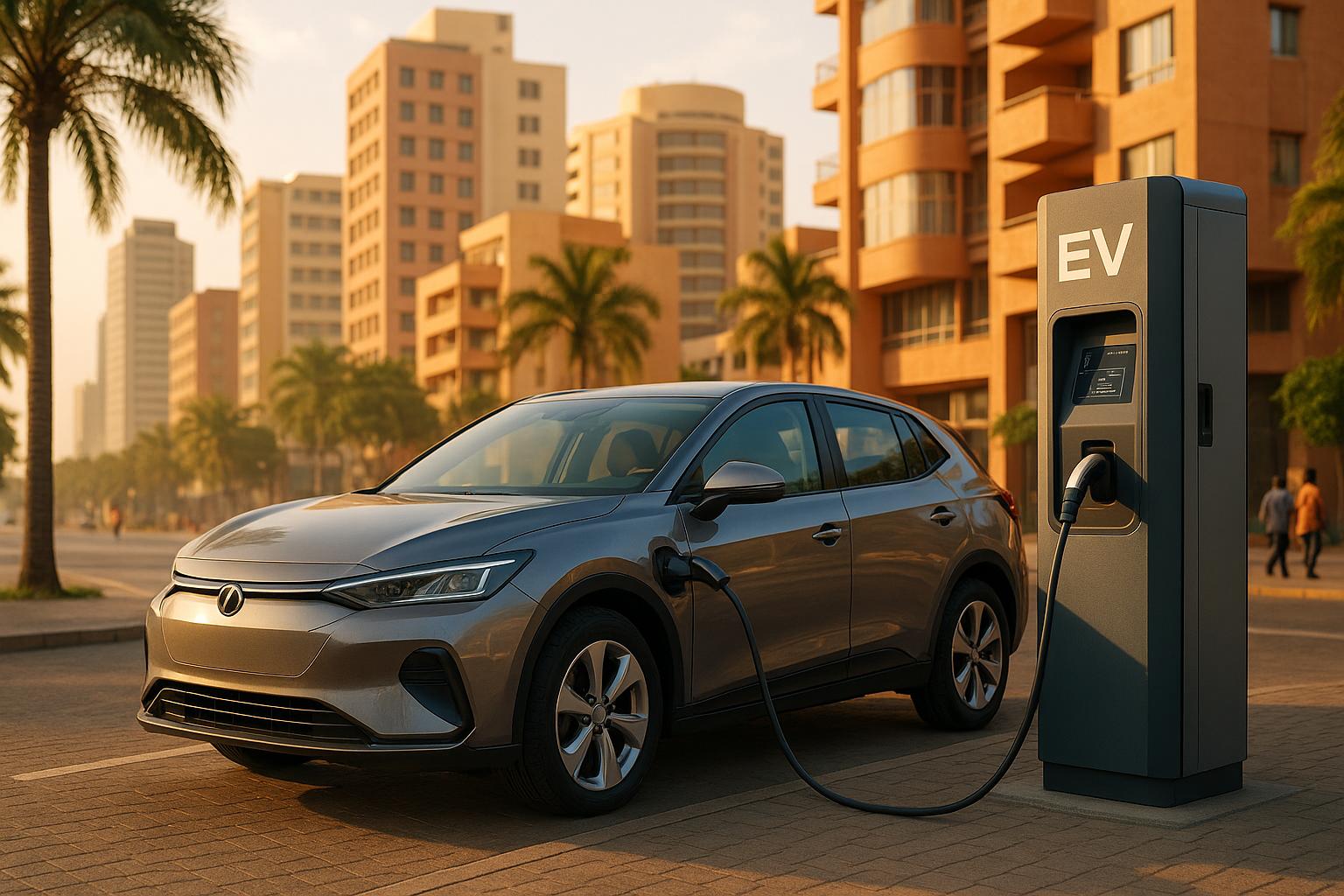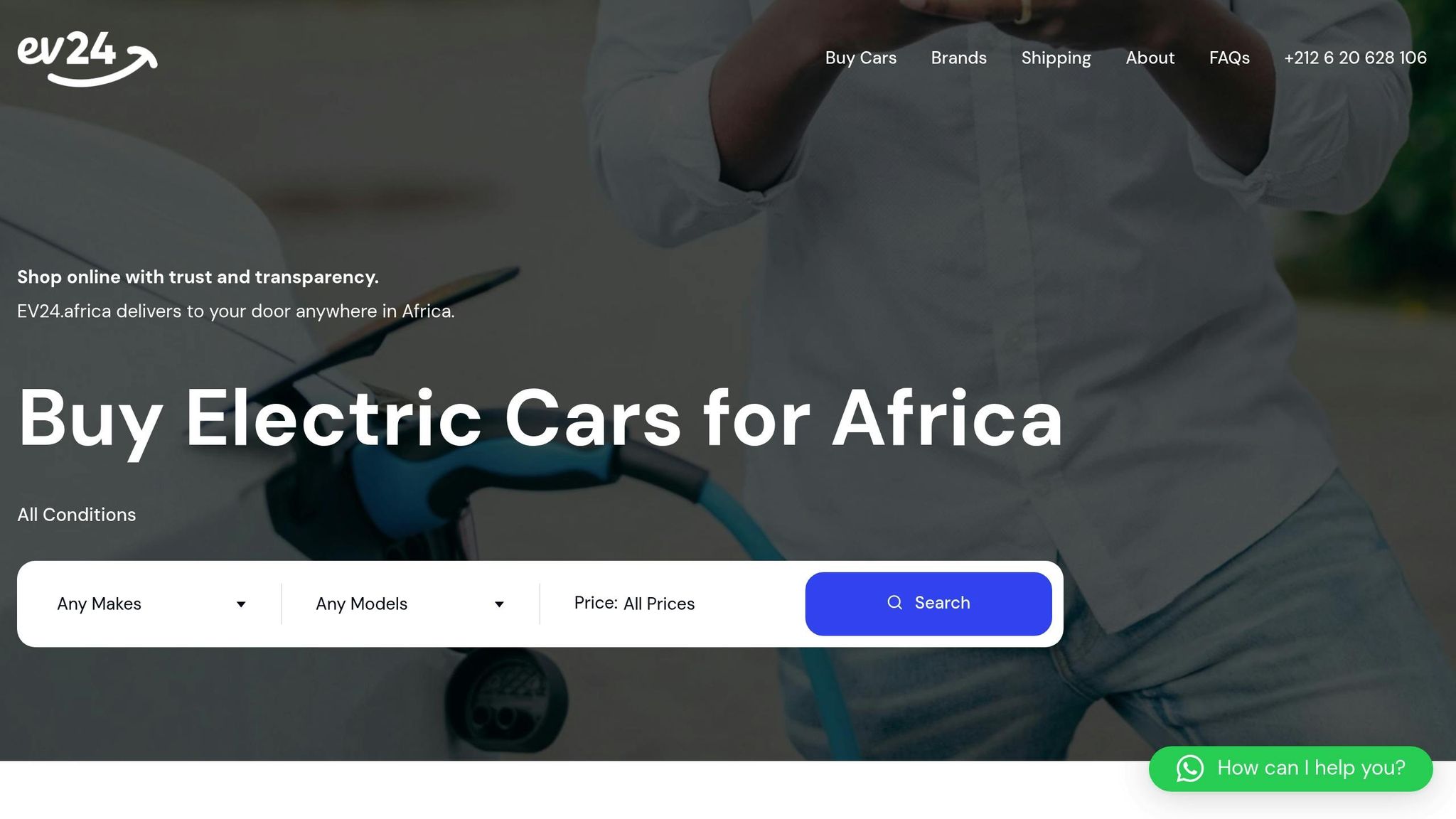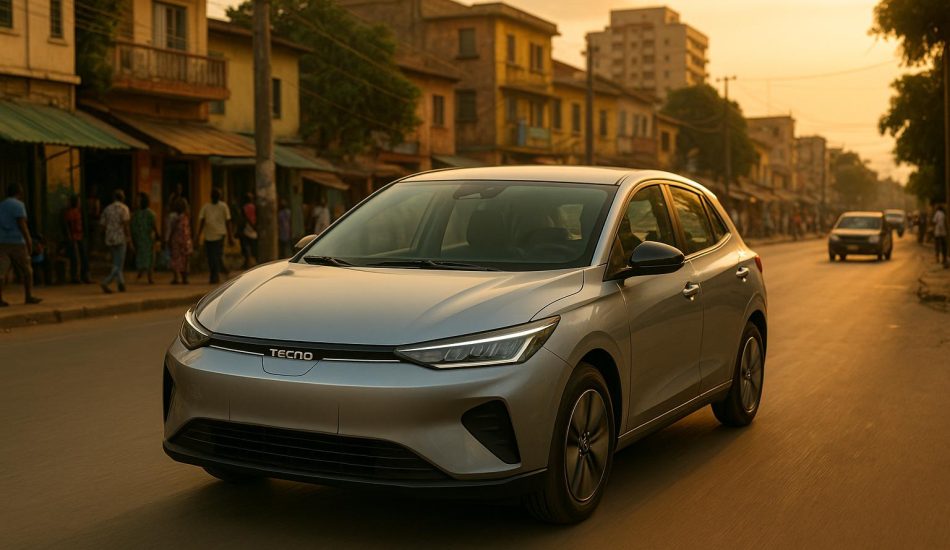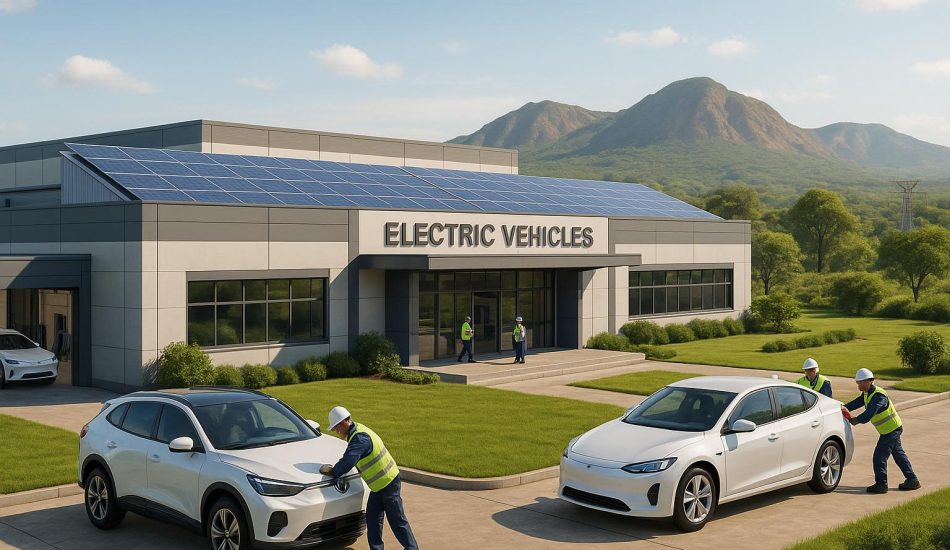
- Revenue Growth: Africa’s EV market is projected to hit $209.9 million by 2025 and grow further to $314.1 million by 2029, with a 10.60% CAGR starting in 2025.
- South Africa Leads: South Africa sold 3,042 New Energy Vehicles (NEVs) in Q1 2024, an 83% increase from Q1 2023.
- Market Value: The African EV market was valued at $15.63 billion in 2023, expected to grow to $28.30 billion by 2030.
- EV Charging Market: Charging infrastructure is expanding fast, with market value rising from $31.93 million in 2022 to $256.53 million by 2030 (30.3% CAGR).
Quick Overview of Leading Countries:
- South Africa: Largest market, with 40% of 2023 NEV sales.
- Morocco: Over 10,000 EVs on the road by 2023.
- Ghana: ~17,000 electric two- and three-wheelers.
- Egypt: EV count grew to 3,500–4,000 by 2023.
Challenges:
- Infrastructure: Less than half of grid-connected households have reliable electricity.
- Affordability: EVs cost significantly more than traditional vehicles, limiting adoption.
Opportunities:
- Electric Two-Wheelers: Lower costs and strong growth potential in markets like Kenya and Nigeria.
- Policy Initiatives: Countries like Rwanda and Ethiopia are removing import taxes and promoting EV-friendly policies.
Africa’s EV market is growing fast, but investment in infrastructure, affordability, and policy support are key to sustaining this momentum.
Market Size and Growth Rates
2023 Market Size and Revenue
In 2023, the African EV market was valued at $15.63 billion. Projections estimate it will grow to $17.41 billion by 2025 and reach $28.30 billion by 2030.
The EV charging market, valued at $31.93 million in 2022, is expected to skyrocket to $256.53 million by 2030, reflecting a 30.3% compound annual growth rate (CAGR) from 2023 to 2030. These numbers set the stage for a deeper dive into sales trends by vehicle type.
Sales Growth by Vehicle Type
South Africa, often seen as a bellwether for the region, demonstrates strong growth across EV categories:
| Vehicle Type | 2022 | 2023 | Growth |
|---|---|---|---|
| Plug-in Hybrid | 122 | 333 | 173% |
| Traditional Hybrid | 4,050 | 6,484 | 60% |
| Battery Electric | 502 | 929 | 85% |
| Total NEVs | 4,674 | 7,746 | 66% |
Current Market Patterns
Recent sales data reveals several emerging trends and milestones. Notably, NEV sales surpassed 1% of the total vehicle market for the first time, climbing to 1.45% in 2023 from 0.88% in 2022.
Battery Electric Vehicle (BEV) sales in South Africa also saw a significant jump, exceeding 500 units in 2022, compared to 218 units in 2021. Meanwhile, the volume-weighted average price for EVs is expected to stabilize around $92,300 by 2025. Looking ahead, the industry anticipates a 10.60% CAGR between 2025 and 2029, with the market potentially reaching $314.1 million by 2029.
China is Taking Over EV and Real Estate Market in Africa
Top EV Markets in Africa
Africa’s electric vehicle (EV) market shows a mix of growth stories, with some countries standing out due to their policies and investments.
Leading Countries by Sales Volume
South Africa is currently the largest EV market in Africa, selling 3,042 new energy vehicles (NEVs) in Q1 2024. This marks an 83% increase compared to Q1 2023 and accounts for nearly 40% of total NEV sales in 2023.
Morocco is another key player, with around 10,000 electric vehicles on its roads by the end of 2023. The automotive industry in Morocco plays a substantial role, contributing 22% to the country’s GDP and generating $14 billion in exports annually.
Other countries making progress include:
- Ghana: Approximately 17,000 electric vehicles, including two- and three-wheelers.
- Egypt: The EV count grew from 1,800 in 2021 to an estimated 3,500–4,000 in 2023.
Each of these nations has adopted strategies tailored to their local conditions, helping them achieve these milestones.
Success Factors by Country
The rise in EV adoption across these markets is tied to specific policies and investments.
| Country | Key Factors Driving Growth |
|---|---|
| South Africa | $54.27 million in government investment; automotive manufacturing hub |
| Morocco | Strong automotive production; focus on exports |
| Rwanda | Battery-swapping systems, two-wheeler electrification, supportive policies |
Regional Market Comparison
Adoption rates and infrastructure development vary widely across Africa, reflecting local priorities and innovations.
- South Africa’s battery electric vehicle (BEV) market share is 0.23%, while Kenya and Rwanda focus on localized solutions.
- Kenya has made strides in assembling and developing electric motorcycles.
- Rwanda’s battery-swapping system is a standout example for electrifying two-wheelers.
A pilot program under the UK Aid-funded Manufacturing Africa initiative highlighted consumer satisfaction, with over 90% of electric two-wheeler users rating their performance as equal to or better than traditional alternatives.
sbb-itb-99e19e3
Growth Factors and Market Barriers
Key Growth Drivers
Africa’s EV market is gaining momentum thanks to government initiatives, cost benefits, and increasing consumer awareness. For example, South Africa has allocated 1 billion rand (about $54.27 million) to promote local production of electric vehicles (EVs) and batteries. This investment is expected to draw in around 30 billion rand ($1.63 billion) from the private sector.
Electric two-wheelers are particularly appealing, with operating costs about 25% lower over five years compared to traditional motorcycles. This is largely due to savings on fuel and maintenance.
Consumer awareness in major markets is also encouraging:
| Country | Consumer Awareness | Key Market Driver |
|---|---|---|
| Nigeria | Over 90% | High fleet turnover in the commercial sector |
| Kenya | Over 90% | Strong potential in the two-wheeler market |
Despite these positive factors, challenges remain that could slow further adoption.
Market Obstacles
Infrastructure remains a significant hurdle. A 2019 survey across 34 African nations revealed that less than half of grid-connected households enjoy reliable electricity.
Affordability is another major issue. In South Africa, the price gap between traditional vehicles (around $25,000) and EVs (approximately $111,000) is a steep $86,000. This disparity limits EV adoption, particularly in sub-Saharan Africa, where 85% of four-wheel vehicle sales are for used cars.
"If you impose bans on their imports, it does not necessarily mean that the people, all of a sudden, have more money to import new ones. But they still have to move. And so what you do is you practically shift the market, demand and supply, to the black market."
– Festival Boateng, senior researcher in mobility governance at Oxford University
Policy Impact on Growth
Beyond financial investments, government policies play a crucial role in shaping the EV market. However, implementation varies widely across the continent. Only 28% of African countries have set national EV targets, and just 39% have introduced legally binding EV incentives.
Some nations are taking notable steps. Rwanda has removed import taxes on EVs, spare parts, batteries, and charging equipment. Meanwhile, Ethiopia has banned imports of fuel-powered cars and is expanding its power infrastructure.
François Zirikana, an advisor for green mobility at GIZ Rwanda, highlights the policy challenges:
"policy-wise, there are still gaps and the environment is not that conducive to startups…Governments fear losing taxes due to tax incentives"
The electric two-wheeler market stands out as a promising area. Projections suggest annual sales could reach three to four million units by 2040 in Kenya and Nigeria alone. This growth is supported by an emerging EV startup ecosystem, which secured over $25 million in funding in 2021.
2024-2030 Market Outlook
Sales and Revenue Forecasts
The African EV market is on track for notable expansion through 2030, thanks to growing consumer interest, smoother import processes, and supportive government policies. These factors, combined with increased investment in infrastructure, are driving sales and revenue growth across the continent.
Market Growth Areas
Consumer interest in EVs is rising alongside improved processes for vehicle imports and registration. Additionally, better access to support services is making EV ownership more accessible. These factors, paired with expanding infrastructure and policy initiatives, are fueling adoption across Africa.
EV24.africa Market Impact

EV24.africa, the first online marketplace in Africa dedicated to electric vehicles, is playing a key role in boosting EV adoption across all 54 countries on the continent. The platform connects buyers with a wide selection of EV models from brands like Tesla, BYD, and Volkswagen, ensuring access to cutting-edge technology and an easy purchasing process.
Here’s how EV24.africa is making an impact:
| Service Area | Market Impact |
|---|---|
| Vehicle Access | Simplifies importing and purchasing electric vehicles across African markets |
| Brand Selection | Provides a wide variety of global EV models |
| Support Services | Assists with shipping, customs clearance, and local registration |
Conclusion: Market Analysis Results
Key Market Findings
The African EV market is on track for substantial growth, with revenue expected to hit $314.1 million by 2029, driven by a 10.60% CAGR starting in 2025. This trend is reflected in South Africa’s Q1 2024 performance, which saw 3,042 New Energy Vehicle sales – an 83% jump compared to Q1 2023.
EV readiness varies across the continent, with countries like Seychelles, Morocco, and Mauritius leading the charge. Here’s a snapshot of key markets and their EV readiness scores:
| Country | EV Readiness Score |
|---|---|
| Seychelles | 0.88 |
| Morocco | 0.85 |
| Mauritius | 0.80 |
| South Africa | 0.80 |
| Rwanda | 0.74 |
These findings highlight areas of opportunity for targeted strategies to drive further growth.
Next Steps for Market Growth
The data points to several priority areas for sustaining and accelerating market expansion. For example, electric two-wheelers offer a cost advantage, with lifecycle costs 25% lower than traditional alternatives over five years. In markets like Kenya and Nigeria, annual sales of electric two-wheelers could reach 3–4 million units by 2040.
"The Electric Vehicles market in Africa is experiencing significant growth and development, driven by various factors such as customer preferences, market trends, local special circumstances, and underlying macroeconomic factors." – Statista Market Insights
To maintain this momentum, stakeholders should focus on:
- Expanding Infrastructure: Build more charging stations and improve grid reliability. Currently, less than half of grid-connected users have consistent access to electricity.
- Innovative Financing: Develop creative credit and financing solutions to make EVs more accessible, especially in sub-Saharan Africa’s used vehicle market.
- Policy Enhancements: Strengthen government incentives and regulations to boost EV adoption while encouraging local production initiatives.
These steps could help unlock the full potential of Africa’s EV market.
FAQs
What challenges does Africa face in growing its EV market, and what solutions are being implemented?
Africa faces several hurdles in expanding its electric vehicle (EV) market. Key challenges include high EV costs, a lack of clear policies, limited charging infrastructure, and the dominance of affordable used gas-powered vehicles. Additionally, unreliable electricity grids make widespread EV adoption difficult.
To address these issues, governments are introducing tax incentives, promoting local EV manufacturing, and investing in charging networks. Some countries are also limiting imports of older gas-powered vehicles and working to stabilize electricity grids. These efforts aim to make EVs more affordable and practical for African consumers while supporting long-term market growth.
How are government policies shaping the growth of the EV market in Africa?
Government policies across Africa are playing a key role in driving the growth of the electric vehicle (EV) market. For example, South Africa plans to introduce tax rebates and subsidies to encourage EV adoption. Starting March 1, 2026, a 150% tax deduction will be available for qualifying investments in electric and hydrogen-powered vehicle production. The country is also working on comprehensive policies for new energy vehicles, including hybrids and plug-in hybrids.
Additionally, several African nations are offering incentives like tax exemptions and investing in charging infrastructure to promote EV usage. These measures aim to make EVs more accessible and affordable, while addressing infrastructure gaps to support the continent’s transition to sustainable transportation.
Why is the electric two-wheeler market growing rapidly in countries like Kenya and Nigeria?
The electric two-wheeler market is expanding quickly in Kenya and Nigeria due to several key factors. These countries are seeing a surge in demand for affordable, efficient transportation, and electric motorcycles are well-suited to meet this need. Additionally, commercial fleets, such as delivery and ride-hailing services, are increasingly adopting electric two-wheelers to reduce operational costs and carbon emissions.
Government initiatives, including incentives and infrastructure development, are also playing a significant role in driving adoption. With growing urban populations and a focus on sustainable mobility, Kenya and Nigeria are emerging as leaders in the African electric two-wheeler market.




